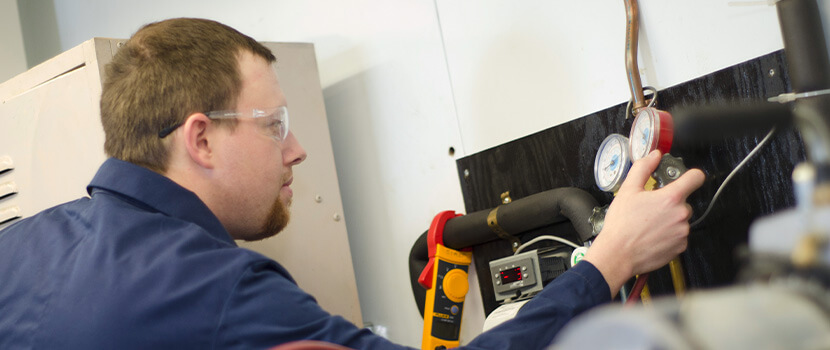
There is steady demand for refrigeration and HVAC (Heating, Ventilation, Air Conditioning) specialists—in commercial, industrial and institutional settings. It is an apprenticeship trade, so you’ll find a clear path to a journeyperson’s ticket and excellent earning potential.
Start date
September
Length
32 weeks
Location(s)
SaskatoonThe job itself has a mechanical focus. You install, maintain and repair refrigeration and cooling systems. But it also involves problem-solving skills, basic math skills, the ability to read and interpret specifications, and the ability to work with power tools and sophisticated technology.
The one-year Refrigeration and Air Conditioning certificate program is offered in Saskatoon. Experienced instructors help you develop the knowledge and skills you need to install, operate and service commercial and industrial refrigeration and HVAC equipment. Your training includes:
- basic refrigeration systems, cycles and components
- system installation
- electrical control systems
- graphics, math, hand tools
- mechanical and electrical skills
- refrigerants and refrigeration load calculation
- safety
- system design, installation, operation
- test and repair system components
Hands-on training
The day-to-day job
Apprenticeship credit
Trade to degree
Career and salary information
Your career
Our graduates are working in installation, service and sales. You could get a job with a refrigeration or air conditioning installation contractor, mine or mill site, manufacturing facility, food wholesaler, engineering firm, retail firm or service company.
Potential careers
| Sample job title | NOC classification |
|---|---|
| Refrigeration and air conditioning mechanic | Heating, refrigeration & air conditioning mechanics (72402) |
Admissions
Admission requirements
- Grade 12 with any 30 level mathematics*
- Minimum overall average of 60%
- English Language Requirement
*Previous Saskatchewan mathematics requirement also accepted:
- a 30-level math (no change for this program)
Alternative admission
Applicants who do not possess the academic qualifications for a program may be admitted if evidence of probable success can be established through an alternative admission assessment. Applicants are automatically considered for alternative admission. However, some specific admission requirements may still need to be met.
ACCUPLACER©
Refer to the ACCUPLACER© cut scores for this program below, and review additional details concerning Alternative Admission using Accuplacer.
- 250 Arithmetic
- 245 Quantitative Reasoning, Algebra, and Statistics
- 247 Reading
- 241 Writing
Post-secondary
Some programs allow applicants to meet the admission grade level requirement using 15 approved post-secondary credits. Review additional information.
Admission method
First Qualified/First Admitted
The First Qualified/First Admitted (FQFA) process is used for the majority of Saskatchewan Polytechnic programs. When we determine that you meet the program's admission requirements, you will be offered admission based on the date you fully qualify for the program. The earlier you provide the appropriate documents and information that qualify you for admission to the next intake, the earlier you might begin your studies.
Applications for all FQFA programs open September 1 each year.
Sponsored programs or programs targeted to specific groups do not accept applications year round or maintain an application pool.
See Admission Processes for more information about this method of admission.
Tuition and fees
Estimates are based on current rates and are subject to change. Amounts for a program may vary by campus. Totals shown here include all mandatory fees as well as approximate cost for books and supplies. Visit the Tuition and Fees web page for a complete breakdown of tuition and fees for this program.
2025-26 academic year
$9,170
Courses
Get credit for what you know
Prior Learning Assessment and Recognition
Saskatchewan Polytechnic recognizes that adults learn in many different ways. This includes acquiring knowledge and skills through life and work experience or non-formal training.
See link(s) below to get more information about PLAR.
Transfer credit
Many Sask Polytech students benefit from transferring course credit. You may be eligible to transfer credit to Sask Polytech or to another college or university.

